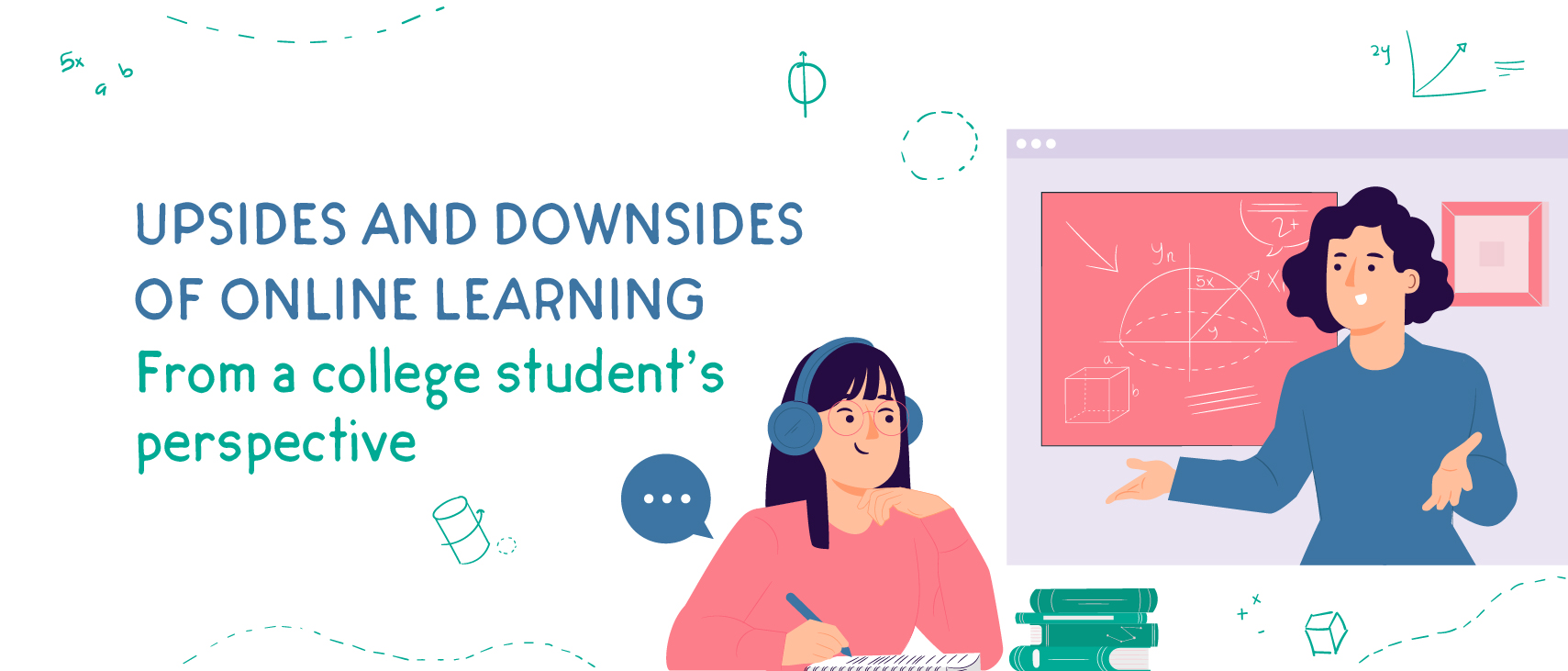Upsides and Downsides of Online learning-from a college student’s perspectives

Author: Pooja Mehta
The pandemic has had a severe effect on the higher education as the school/ universities closed their campuses and the countries have shut their borders as a result of the lockdown measures. The solution adopted to efficiently replace the face-to-face classes was switch to E-learning. But these have majorly affected the learning and examinations, and also the legal status and the safety of the international students in their host country. Every major university and college have switched to E – learning due to the current pandemic. Online education is the learning which takes places through internet and online platforms. Finding a way for the education to continue without interruption, has led to this type of “distance learning” as against a traditional classroom or physical set up. Let’s look at the both sides of how this has impacted college and university students.
There are quite a few advantages and positive aspects of online education. Firstly, there is more flexibility for the students to study and do their assignments. The students and the teachers have become more tech savvy; they have learned to use the technology in multiple ways to their own benefit. Also, all the study material can be safely stored on an online database.
technology in multiple ways to their own benefit. Also, all the study material can be safely stored on an online database. There is also an option for the students to go back to the recorded lectures if they face difficulties while studying- which is an added advantage as the access is easy and quicker. It has been researched that online learning helps students retain 25 – 60% more material as compared to 8 – 10% in a physical set up. This is because the students are able to learn faster online, since they can learn at their own pace and revisit the material whenever needed. This is beneficial for the college students as they do not have to worry about where to study for their exams or to spend a lot of time into finding material to study from. The re-visiting of the lectures adds up to benefit them.
Further, the need for online education has facilitated the development of new innovative methods of teaching with the help of technology and online tools. It helps in reaching out to a large number of students across the globe at the same time. Even with the pandemic, the education system has tried to switch to online platform in order to continue with education and not put a pause on the same. Additionally, E learning makes it possible for the students to learn through their comforts and safety of their homes as well as do multiple courses or classes through online mode. They also have ample amount of time to engage in other projects or personal hobbies. Moreover, students can save up on the travelling cost as well as their time.
However, while there are some definite advantages, the sudden switch to online education or courses or classes does have many downsides and setbacks to the learning experience for the students. Majority of the students may be able to relate to some of the issues described below.
Even though online mode of learning offers more time and greater number of opportunities for students, it can become mundane and tiring to spend majority of the day staring on the laptop screen. It makes difficult for students to maintain concentration and consistently. Meeting friends, peers and participating in college events is a huge part of college experience that most students look forward to. This lack of a social life and daily interaction can impact the students negatively and lead to feelings of sadness, loneliness and isolation. This is because the students wouldn’t get to meet any of their peers and hence the socialization declines.
Further, online education takes a long time and practice to get adjusted to. It lacks face to face connection with the peers or students and the professors. Moreover, complete reliance on video or audio connectivity; sometimes create barriers in communication and learning. The online format also limits connection and development of necessary professional relationships between students and teachers. It is also very difficult to facilitate free conversations, discussions and mentoring. Additionally, there is uncertainty and issues in reaching out to all the students due to the technological limitations.
Moreover, the students who just entered college or was their last year really missed out on the whole college experience. Majority of the students would prefer physical classes to take place so that they can enjoy their college like as it was supposed to be.
Lastly, most of the schools and colleges continue to focus on the traditional academic skills which mainly consist of “rote learning”, rather than the skills like critical thinking and adaptability. These set of skills are important for success in the coming future. Therefore, the move to e-learning could be the catalyst to fabricate an innovative and more effective method of educating the students.

